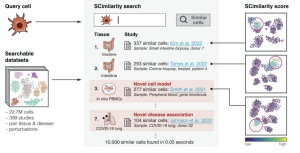Early-life sugar intake affects chronic disease risk

At a Glance
- Low sugar exposure in utero and in the first two years of life was associated with lower risks of diabetes and high blood pressure.
- The findings suggest that restricting sugar intake during this critical period could have lifelong health benefits.
Current U.S. dietary guidelines recommend no consumption of added sugar from in utero up until age 2. Yet most U.S. children are exposed to added sugar from a very early age. This can include before birth and during breastfeeding through the mother’s diet.
An NIH-funded research team led by Dr. Tadeja Gracner at the University of Southern California set out to study how exposure to sugar in utero and during infancy affects the later risk of diabetes and hypertension. To do so, they used a natural experiment: sugar rationing in the United Kingdom during and after World War II.
During rationing, the allotted amount of sugar was similar to current U.S. dietary guidelines: less than 40 grams per day for adults, less than 15 grams for children, and very limited amounts for children under 2 years. Sugar consumption nearly doubled immediately after rationing ended in September 1953.
Using data from the UK Biobank, the team looked at health outcomes for more than 60,000 people born between October 1951 and March 1956. Participants were aged 51–66 when last surveyed. Those born in July 1954 or later were conceived after the end of rationing, and thus never experienced sugar rationing, even in utero. The rest experienced rationing to varying extents, ranging from only in utero up to 2 years of age. Results appeared in Science on October 31, 2024.
The researchers found that early life exposure to rationing reduced the risk of diabetes and hypertension decades later. Risk declined with longer exposure to rationing, particularly for exposures longer than six months postnatally. People with the longest exposure to rationing had about 35% lower diabetes risk and 20% lower hypertension risk than people who were never exposed to rationing. They also had a four-year average delay in diagnosis of diabetes and a two-year average delay in diagnosis of hypertension. Those exposed only in utero had about a third of the risk reduction that those with the longest exposure did.
“Studying the long-term effects of added sugar on health is challenging,” Gracner notes. “It is hard to find situations where people are randomly exposed to different nutritional environments early in life, and follow them for 50 to 60 years. The end of rationing provided us with a novel natural experiment to overcome some of these challenges.”
The findings suggest that limiting sugar exposure in utero and during the first two years of life could protect against type 2 diabetes and hypertension. This, in turn, could reduce health care costs and extend life expectancy. The findings reinforce the outsized impact of early diet on long-term health.
“We are learning that many prenatal conditions can influence risk or resilience to chronic diseases later in life,” says Dr. Kriti Jain, a program official at NIH’s National Institute on Aging. She notes that this research builds on earlier findings related to fetal exposures, such as links between economic hardship and famine with accelerated aging, and famine with obesity.
Further studies will be needed to determine exactly how early sugar consumption leads to long-term health consequences.
—by Brian Doctrow, Ph.D.
Funding: NIH’s National Institute on Aging (NIA).








